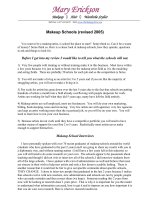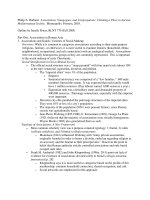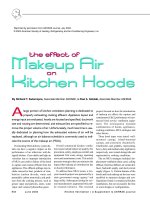Mary Erickson- Makeup school ( resived 2005)
Bạn đang xem bản rút gọn của tài liệu. Xem và tải ngay bản đầy đủ của tài liệu tại đây (123.12 KB, 7 trang )
Mary Erickson
Toll-Free 1-877-242-6878 Web: www.TheMakeupArtist.com
Makeup
◊
Hair
◊
Wardrobe Stylist
Makeup Schools (revised 2005)
You want to be a makeup artist, is school the place to start? Some think so. Can it be a waste
of money? Some think so. Here is a closer look at makeup schools, how they operate, questions
to ask and things to look for.
Before I get into my review I would like to tell you what the schools will not.
1) Very few people with training or without training make it in this business. Most leave within
a few years because it is just as hard to break into the makeup artist field as it is the modeling
and acting fields. There are probably 50 artists for each job and so the competition is fierce.
2) You will not make a living as an artist for 3 to 5 years and if you are like the majority of
struggling artists, you will never make a living at it.
3) Pay scale for artists has gone down over the last 5 years due to the fact that schools are putting
hundreds of artists a month into a field already overflowing with people desperate for work.
Artists are working for half what they did 5 years ago, many have left the field entirely.
4) Makeup artists are self employed, most are freelancers. You will do your own marketing,
billing, book-keeping, taxes and invoicing. Very few artists are with agencies; very few agencies
can keep an artist working more then the occasional job, so you will be on your own. You will
need to learn how to run your own business.
5) Because artists do not work until they have a competitive portfolio you will need to have
another means of support for your first 2 to 5 years. Realistically most artists never make
enough to support themselves.
Makeup School Interviews
I have personally spoken with over 70 recent graduates of makeup schools around the world
(students who have graduated in the past 2 years) and I am going to share my results with you in
a diplomatic way, and without naming names (I still have a few years left in this industry) so
you will still need to do some research on your own. The schools appear to be passionate about
teaching and though I did not visit or interview all of the schools, I did interview students from
all of the large schools. I have spoken with a lot of administrators as well and believe that most
are sincere in their wish to help new artists and only a few deserve a public lashing. There is
another reason that it would not be fair to give out specific comments about specific schools,
THEY CHANGE. I chose to interview people that graduated in the last 2 years because I realize
that schools evolve with new teachers, new administrators and schools are run by people, people
who can make mistakes and then correct them (we hope). Someone reading this 2 years from
now will be looking at research done 3 years prior. That is why it is important for you the reader
to understand what information you need, how to get it and to impress on you how important it is
that you do your own research. Here is what my research taught me.
Ignore your first impression
Lets start with the first impression. Upon my arrival at a few of the schools I visited I was
disappointed in the school building and surrounding area. I now know that you cannot judge a
school by the building or location it is in. When I drove up to some of the schools my first
reaction was “This is it? This is all of it? This is where people come from all over the world to
learn makeup from the masters? This could be a 7-11 next week!” Be prepared to be
unimpressed with some of the schools’ grounds, but don’t let it stop you - go inside! And
remember in California and New York rents are high, the appearance of the school and the
location had nothing to do with student satisfaction!
Ignore what they say about each other
The interior of each school is as different as the way each school is run and the personalities
behind the people running them. In my conversations with the people running these schools one
theme was prominent. They are very competitive with each other! I suppose that makes sense,
being a trait of most successful artists. They each think they are the best, with no doubt about it,
if you only visit one school you will walk away convinced that the others are terribly flawed.
You must visit more then one school when you are making this decision. My best advice to you
is to stay clear of any school that speaks poorly of another school or artist in any way, common
sense tell you that low character probably permeates the school. How to spot an administration
with character? An honest administrator will tell you that this is a very tough field; there are
hundreds of artists and only a few jobs. You most likely will work free for a few years; you
won’t make a dime until you have a great portfolio and or reel, you will work your butt off to get
this and then you will be out on the street competing with hundreds of artists in your area that
have done the same thing The world would be a better place if everyone were this honest but
unfortunately the goal for most is to part you and your money, your future is not on their minds.
Being accredited does not mean it is a better school
I asked each school about accreditation. I was surprised at the answer I first got, until I got
the same answer from many of the schools. Why are you not accredited? The answer usually
sounded something like this… “Because if you are accredited you must take people in your
school that don’t really want to be there.” When a school becomes accredited (by the state of
California for one) grants and loans are available for a lot of different people, people that may be
on public aid that need to go to a school as required by law. They may choose a makeup school
to fill this requirement with no intention of really ever doing anything with the knowledge.
These people can bring morale down, not pay attention, be disruptive etc. Being accredited takes
control away from the school and gives it to the state. Taking students on public aid of some
kind is not what the schools have a problem with; it’s not having a choice to pick and chose who
is suitable for the school.
It does matter that the school is licensed (but very little)
Being licensed can be important; you must be licensed to operate in the State of California and
many other states. What if you attend a school that is not licensed? You risk losing your tuition
if the state closes the school. This is always a possibility though rare and so you should check to
make sure the school is licensed. Be aware that there are schools operating without a license.
They gamble that you will never check and they are usually right, you probably won’t.
Talk to past students
After visiting 5 schools I decided that visiting more schools would do nothing more for me or
the reader. What the students have to say after graduating is much more important then any
other research you can do on this subject. In many cases what I heard from students was very
different than what I heard from the school administration. Below I am listing the major
problems that students tell me they are encountering.
Talking to past students is the biggest eye opener, and if this does not convince you to do your
homework nothing will!
Over 75% of the respondents from two of the major L.A. schools said they would NOT
recommend their school to others, and it was NOT worth the money.
Talk to past graduates
One major LA school had only one respondent out of 30 who replied that they were dissatisfied
and would not recommend the school to others. WOW, what a difference in satisfaction rates.
How is this for an eye opener…the school that I would have chosen after visiting all of them and
speaking with the staff was the one with the worst student feedback. If you are not interviewing
past students you run a big risk of being dissatisfied with the school you choose.
Here is the good news
Many students had wonderful things to say about their schools and I am going to share the
comments here.
More good news: If you’re in the State of California and you are dissatisfied you can probably
get a refund for the classes you have not yet attended. Other states have consumer laws as well;
you need to check the laws in your particular state. Stay away from any school that does not
offer a refund of your remaining classes if you are dissatisfied. If they cannot insure your
satisfaction they shouldn’t get your business.
Lets say you are on day 4 and decide that this school is not right for you. If you are bold enough
and you should be, you can request a refund of your tuition in writing and you will get it, all
except of course what you used (4 days worth). The following is taken from the MUD catalog.
The Private Postsecondary and Vocational Education reform act of 1998, State of California
states the following. In the event a student withdraws prior to the completion of his/her course a
refund shall be made to the student of his or her unused tuition and lab fees. The refund policy
for students who have completed 60% or less of the course of instruction shall be a pro rata
refund. Except for the registration fee the refund shall be the amount the student has paid for the
instruction multiplied by a fraction, the numerator of which is the number of hours of instruction
which the student has not received but for which the student has paid and the denominator of
which is the total number of hours of instruction for which the student has paid.
Bottom line, if you are not happy with your education hand a written notice of your intent to
withdraw to the administration and you should be refunded most of what is left of your tuition, at
least in California. You will probably lose your registration fees and money you have paid for
supplies.
To avoid this unfortunate scene I am giving you things to look for in advance. The following are
the most common complaints I heard when interviewing students that graduated from makeup
schools around the country. I am rating them in order, number 1 being the complaint I heard
most often and so on.
#1 Complaint
Out dated teaching methods
The teacher is a career teacher and has been out of the field too long. You can be the best teacher
in the world, but if you cannot give updated information from on the job experience, the
graduates I talked to do not favor you as a teacher. There are people teaching that have not
worked a real job in the industry in years. They may not admit it but it is apparent after spending
a bit of time with them. On the other hand are you going to get Kevin Aucoin or Rick Baker to
come in and teach for standard teachers rates? Probably not, not on a regular basis anyway, so
what is a school to do? The student would have to pay 10 times the tuition to get teachers like
Rick Baker on a daily basis and who can afford to pay that kind of tuition? A lot of the schools
have guest artists that come in and they are very good at what they do; they are still working but
take a short time off to teach. I think this is a great way to get up to date teachers but are they
good teachers because they are good artists? Not always. These are a few more reasons why you
must talk to past graduates of the schools you are considering.
Do NOT rely on testimonial you see on their websites or in their schools, these are easily made
up. Do not pay attention to any portfolio in the school that is not on a public access website,
these photos can be taken from any magazine and placed in a portfolio and I know for a fact
there are portfolios in these schools that are not of work done by anyone in the school I also
know of one school that has stolen photos on their website, mostly ALL of them stolen. People
that will do this are out to steal from you as well, so buyer beware.!!!!
#2 Complaint
Instruction moved to fast
This was a common complaint and not one that can be fixed easily. If you want the instruction
to slow to half the speed with more hands –on, you will have to be at the school twice as long
and pay twice as much. In the end the schools know you probably don’t want to do that so they
do cram the lessons in. It is up to you to study and practice on you own. Don’t expect to leave
any school with all the hands on experience you will need - it is unrealistic to expect that to
happen. A few of the schools did offer refresher courses for free or at a low cost, so that you can
go back and take classes over for which you feel you need more practice. I don’t think most
people do it but it is something that could be of great value to you as makeup styles change and
methods change. A lifetime of continued learning for free seems to me to be a great benefit. If
this is important to you, be sure you get the policy in writing, there is some confusion
surrounding this policy. Some of the schools only let you come back for a few hours, some let
you come back for full classes. Check with the school and get their policy it in writing.
#3 Complaint
I was promised portfolio photos and got amateur looking photos that I could never use in a
book.
When a school offers professional looking photos to start your book you need to ask about price.
Schools can set the price at any amount they like for photos, if you are paying $25.00 per photo,
that is adding $100.00 to your school costs and that’s fine if you really want them in your book
and understand up front what this will cost you. Who will the models be? Other students
probably won’t make good models for your portfolio. Ask to see the photographer’s work. I
found a few of the photographers being used were new photographers trying to get a break and
their work was not good enough to go in an artists portfolio. This is an area that I found a lot of
dissatisfaction. Many of the students I talked to felt they were led to believe that the
photographers used were professional and very good. When photos came back they were not
professional looking at all. I did personally get to see the work that a few of the artists had done
at school and it was not good photography by any standards. I have no problem with using
amateur models and photographers but some of the schools inform the students that they will
have a beginning portfolio when they leave. In reality they have photos but not photos they want
to put in their portfolio. I have never seen a photo taken at a makeup school that would be usable
in my opinion.
#4 Complaint
Cancelled classes/ switched teachers
At some of the schools there is a good chance that classes will be cancelled if the enrollment
isn’t large enough, or if the teacher gets a good job offer. In most cases the school will offer the
class at a later date so you can make it up, but a few students found this to be very bothersome.
Check with the school you are considering for the school policy on this issue. If you are coming
from out of town and staying in a hotel this could be a major issue for you. The school may also
slip another teacher on you, one that has very little experience in the industry. You may even get
a past student teaching. Make sure you get a written agreement upfront on who your teacher for
each class will be, insist on taking no substitutions.
#5 Complaint
The subject matter was too basic
“The beauty course was too basic.” My survey showed that of the respondents who had already
had some experience as artists, 75% felt the beauty courses were too basic and they considered it
a waste of their money. There are schools that require you start at the very beginning and relearn
the basics. I talked to Tobi Britton about this and her answer made sense to me. She said that
many artists have been doing basic makeup with their own self taught methods for years and do
not even realize that there is a better method and perhaps they do need to get back to basics and
start over. That seems to be a valid point but if you are good and you know it, and you don’t
want to start with the very basics, you may want to chose a school that will allow you to skip the
basics and go right into the advanced classes. In my experience most people that are self taught
have learned a few bad habits that need to be broken, starting at the beginning is probably best
for most people.
#6 Complaint
The courses were geared towards film and TV; the school was lacking good instruction in print makeup.
There are a few schools that cater to the future print artist but in my info-gathering search of the
schools it appears that a majority of the big name schools are preparing the future artist for film
work. They offer print classes but it may not be their major focus. Find out who teaches the
print class. If you want to be a print artist; make sure you learn from a print artist and not
someone who has been doing film for the last 10 years. Ask to see the teacher’s portfolio; it
should be a public portfolio (on the internet preferably) not one hidden away. Find out what jobs
this teacher has done in the past year. Has the teacher been stuck in the classroom for the past 2
years without working in the real world? This field changes quickly, like fashion, makeup
changes with the season. I would only accept a teacher that is out there working in the real world
at least part of the time. NEVER expect a TV/Film teacher to be good enough with print
makeup to teach it, they are very different fields of makeup and TV makeup people do not
normally make good print artists. Artists can be very good at both but a good print artist makes
VERY good money and I have never seen one teaching for a living.









